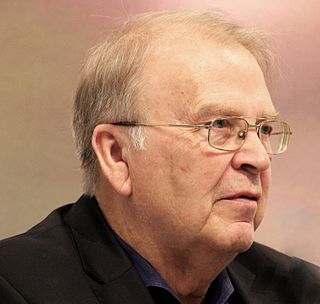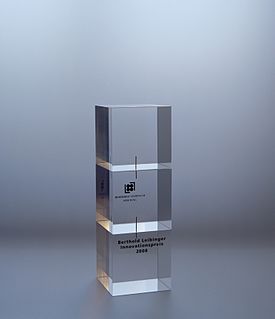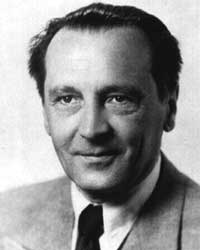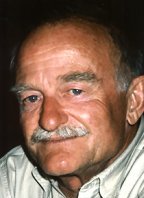Related Research Articles

Bille AugustRD is a Danish director, screenwriter, and cinematographer of film and television. In a career spanning over four decades, he has been the recipient of numerous accolades, making him one of the most acclaimed contemporary Danish filmmakers.

The GSI Helmholtz Centre for Heavy Ion Research is a federally and state co-funded heavy ion (Schwerion) research center in the Wixhausen suburb of Darmstadt, Germany. It was founded in 1969 as the Society for Heavy Ion Research, abbreviated GSI, to conduct research on and with heavy-ion accelerators. It is the only major user research center in the State of Hesse.

Friedrich Ludwig "Fritz" Bauer was a German pioneer of computer science and professor at the Technical University of Munich.

Theodor Wolfgang Hänsch is a German physicist. He received one fourth of the 2005 Nobel Prize in Physics for "contributions to the development of laser-based precision spectroscopy, including the optical frequency comb technique", sharing the prize with John L. Hall and Roy J. Glauber.

Wilhelm Genazino was a German journalist and author. He worked first as a journalist for the satirical magazine pardon and for Lesezeichen. From the early 1970s, he was a freelance writer who became known by a trilogy of novels, Abschaffel-Trilogie, completed in 1979. It was followed by more novels and two plays. Among his many awards is the prestigious Georg Büchner Prize.

Peter Zoller is a theoretical physicist from Austria. He is Professor at the University of Innsbruck and works on quantum optics and quantum information and is best known for his pioneering research on quantum computing and quantum communication and for bridging quantum optics and solid state physics.

Stefan Walter Hell HonFRMS is a Romanian-German physicist and one of the directors of the Max Planck Institute for Biophysical Chemistry in Göttingen, Germany. He received the Nobel Prize in Chemistry in 2014 "for the development of super-resolved fluorescence microscopy", together with Eric Betzig and William Moerner.

The Berthold Leibinger Innovationspreis is an award for given to those who have created applied laser technology and innovations on the application or generation of laser light. It is open to participants worldwide. It is biennially awarded by the German non-profit foundation Berthold Leibinger Stiftung. Three prizes are awarded worth 100,000 euros. The prize winners are selected from eight finalists that present their work person in a jury session. The jury is composed of international experts from different fields.

Josef Mattauch was a nuclear physicist and chemist. He was known for the development of the Mattauch-Herzog double-focusing mass spectrometer, for his work on the investigation of isotopic abundances using mass spectrometry, and the determination of atomic weights. Much of his career was spent at the Kaiser Wilhelm Institute for Chemistry.

Berthold Leibinger was a German mechanical engineer, businessman, and philanthropist. He was the head of the German company Trumpf, a leader in laser technology, and founder of the non-profit foundation Berthold Leibinger Stiftung. He served on the advisory board of major companies and was awarded an honorary doctorate by the University of Stuttgart.
Christoph Helmut Keitel is a German physicist, presently a director at the Max Planck Institute for Nuclear Physics in Heidelberg and an honorary professor ("Honorarprofessor") at Heidelberg University.
Christoph Cremer is a German physicist and emeritus at the Ruprecht-Karls-University Heidelberg, former honorary professor at the University of Mainz and was a former group leader at Institute of Molecular Biology (IMB) at the Johannes Gutenberg University of Mainz, Germany, who has successfully overcome the conventional limit of resolution that applies to light based investigations by a range of different methods. In the meantime, according to his own statement, Christoph Cremer is a member of the Max Planck Institute for Chemistry and the Max Planck Institute for Polymer Research.

Ernst-Wolfgang Böckenförde was a German legal scholar and a judge on Germany's Federal Constitutional Court. He was a professor at the University of Freiburg and the author of more than 20 books and 80 articles dealing with legal and constitutional theory, as well as political theory, political philosophy and Catholic political thought. Böckenförde was considered a member of the Ritter School.

Dr. Hans Adolf Breuer was a German physicist and author of 23 mainly scientific books.

Klaus Dieter Laser was a German actor. Laser's career spanned over five decades, appearing in both German and English-language productions. He achieved recognition for his lead role in the 2009 film The Human Centipede and also starred in the third entry in 2015. On television, he had a recurring role on Lexx from 1998 to 2000.
Prof. Dr. h.c. Hans Josef Vermeer, was a German linguist and translation scholar.

Hanns-Josef Ortheil is a German author, scholar of German literature, and pianist. He has written many autobiographical and historical novels, some of which have been translated into 11 languages, according to WorldCat: French, Dutch, Modern Greek, Spanish, Chinese, Lithuanian, Japanese, Slovenian, and Russian.
Friedrich Wilhelm Stein was a German theologian, conductor, musicologist and church musician. He found in an archive in Jena the score of the so-called Jena Symphony, which he published as possibly a work by the young Ludwig van Beethoven. After a long period in Kiel from 1919 to 1933, teaching at the Kiel University and as Generalmusikdirektor, he had a leading position in the Reichsmusikkammer of the Nazis in Berlin.
Josef Protschka is a German operatic tenor who also sang lieder and oratorio and made many recordings. A long-term member of the Cologne Opera, he appeared at international opera houses and festivals, with a focus on Mozart's roles such as Tamino. As an academic voice teacher, he was rector of the Hochschule für Musik und Tanz Köln from 2002 to 2009.
Fawzi Boubia, born in 1948 in Khemisset, is a Moroccan intellectual.
References
- ↑ "Deutscher Zukunftspreis: Laseroptische Diagnose und Therapie: Perfektes Sehen für jedermann". Archived from the original on 2016-06-10. Retrieved 2016-05-16.
- ↑ Bille, Josef (2012). "Europäischer Erfinderpreis für Professor Josef Bille: Heidelberger Physiker bringt den Laser in die Augenheilkunde". archiv.ub.uni-heidelberg.de. doi:10.11588/heidok.00013888 . Retrieved 2019-10-24.